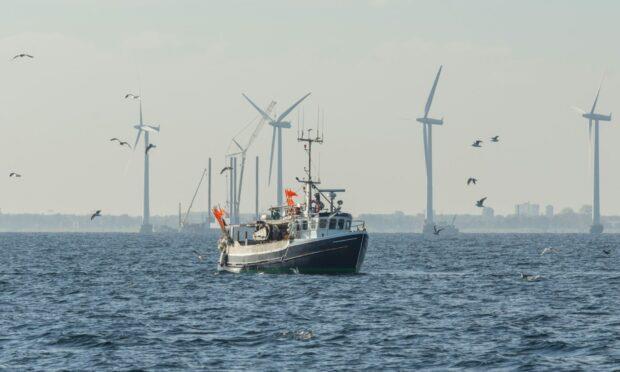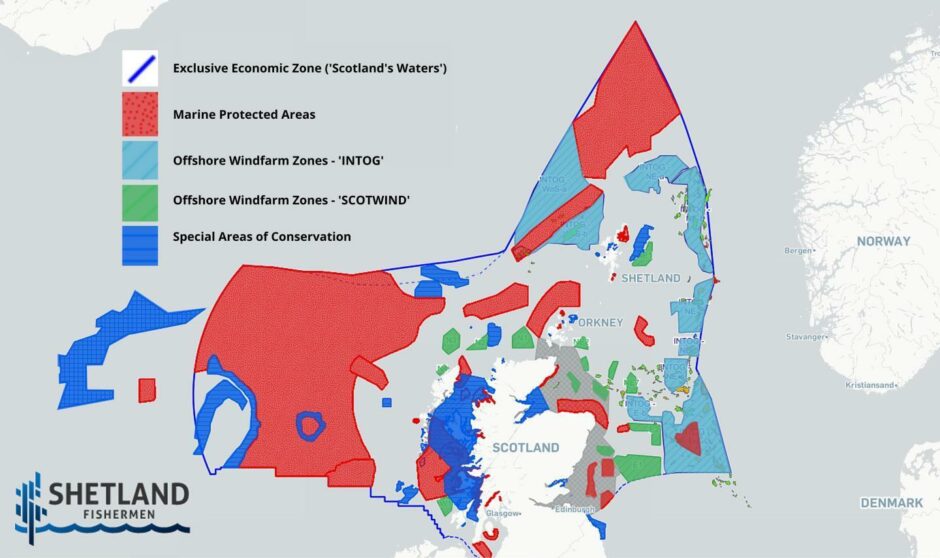
Shetland fishing chiefs have claimed offshore wind farms and marine protected areas are threatening livelihoods in their industry.
Fishers are being crowded out of their traditional grounds by a combination of renewable energy developments and “excessive” conservation measures, they said.
These pressures may lead to vast areas of Scottish waters being closed off or subjected to severe restrictions, they warned.
Shetland Fishermen’s Association (SFA) executive officer Daniel Lawson said: “Fishing crews, so vital to Shetland’s economy, are being displaced from grounds where fishing has been going on for hundreds of years as part of a so-called ‘just transition’ that is anything but just.
“Sadly, a climate-smart industry that has among the lowest carbon footprints and lowest food miles of any food producer is in danger of being sacrificed for no good reason.
“Ministers urgently need to take stock of the situation and ensure there is enough space for the fishing industry to continue to succeed and to support our community’s future.”
Scottish Government plans to build on existing restrictions for Marine Protected Areas (MPA) and Special Areas of Conservation near Shetland will mean more fishing grounds lost.
The industry says this means fishing effort will inevitably become more highly concentrated in areas that remain accessible.
Holyrood’s 2022 Programme for Government commits to also designating 10% of Scotland’s sea space as “highly protected”, on top of the existing MPA network.
In addition, offshore wind farm developments are being encouraged by the leasing of seabed sites through Crown Estate Scotland’s ScotWind and Intog (Innovation and Targeted Oil and Gas decarbonisation) auctions.
In its recently published fisheries management strategy, the government said fishing was a “vital part of Scotland’s economy”.
The document set out Holyrood’s ambition to “secure the future of our fishing industry for generations”, as well as its commitment to building a “world-class fishing nation”.
But, according to the SFA, ministers are “inhibiting” these aims through their actions on protected areas and “short-lived” offshore renewable projects.
Mr Lawson added: “A well-managed and well-supported fishing industry could continue to provide for generations to come.
“Coastal communities currently reap the benefits of the seafood brought back by our sustainable, modern, family-owned fishing fleet.
“Profits from offshore windfarms will disappear into the budgets of private, wealthy, multinational energy firms.”
He continued: “There is space for fishing, marine protection measures and offshore wind to all enjoy mutual futures.
“Our members accept and understand the way the world is going, but so far this ‘just transition’ is taking away vast fishing grounds – and giving nothing in return.”
Holyrood response
A Scottish Government spokesman said: “It is vital the double crises of climate change and nature loss are addressed and this does highlight the multiple interests in the marine space.
“Measures such as Marine Protected Areas are necessary to help safeguard marine biodiversity which ensures the fishing industry is sustainable for current and future generations.
“Renewable energy is a key requirement to enable the move to net-zero, which in turn will support the resilience of marine habitats and the industries which they support.”
The spokesman added: “Stakeholders – including fishers – are consulted before a Marine Protected Area is introduced, in the development of offshore renewables and as part of the consenting process for determining each wind farm application.”
Recommended for you

 © Supplied by DCT Media
© Supplied by DCT Media